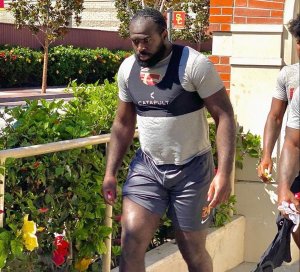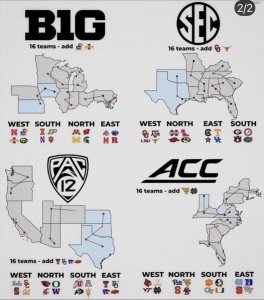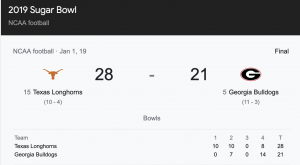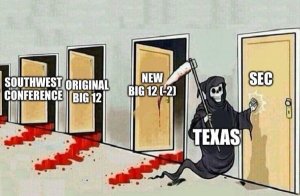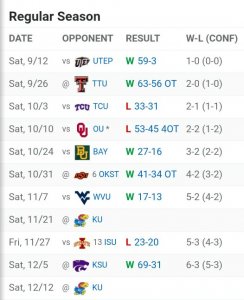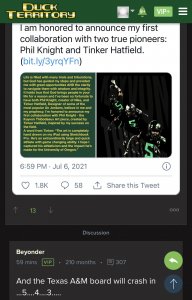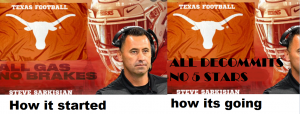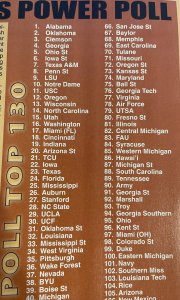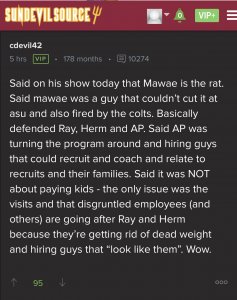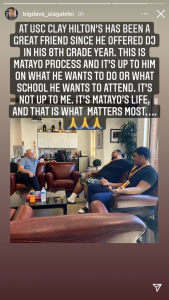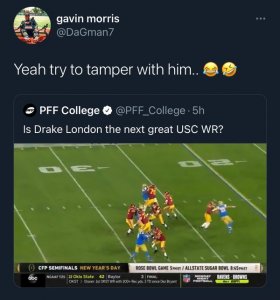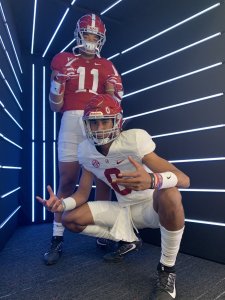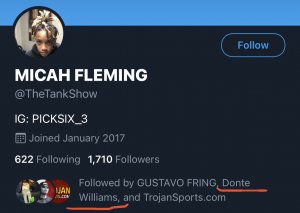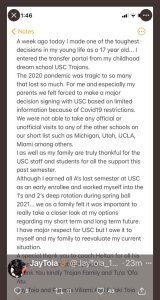Parent 1 is the father of a 2022 blue-chip prospect
Parent 2 is the father of a 2022 blue-chip prospect
Parent 3 is the father of a 2021 blue-chip ACC signee
Parent(s) 4 are the mother and father of a 2021 ACC signee
Parent 5 is the father of a 2021 blue-chip Big 10 signee
Parent 6 is the father of a 2022 blue-chip prospect
Parent 7 is the father of a 2022 blue-chip prospect
Parent 8 is the mother of a 2022 blue-chip prospect
Parent 9 is the mother of a 2021 G5 signee and a 2022 recruit
Parent 10 is the father of a 2022 blue-chip prospect
One thing you won’t see in this survey: any outright admission of
under-the-table recruiting tactics or cheating, although one parent claimed to know of someone else who had been offered money and another cracked, “Well, maybe (my son is) not that good.”
Which recruiting pitches work?
Parent 1: I think the ones where they were the most honest and there wasn’t a lot of fluff and they were very direct about what the program can offer, and the status of their program.
Parent 2: Honesty, for me.
Parent 3: I think the ones where the coach and the kid develop a relationship and where there appears to be honesty and sincerity as opposed to when someone comes in and pitches flash and everything.
Parent 4: The family approach. That made us feel more comfortable.
Parent 6: I would say probably none of the recruiting pitches work. I would say the recruiting pitch where you’re genuine and don’t have to pitch. … The ones that work are the ones that come off genuine and sincere.
Parent 7: For me, it’s more about education and how you’re going to get the athlete through school with their degree. … Some of the schools really laid the plan out for him, and that’s what I was pleased about.
Parent 10: The one who not only connects with the student-athlete but also with his family. Some tend to focus more on the kids and not so much on the immediate family. On the other side of it, there are some who check off all the boxes, the mom, the dad, the sister, the siblings. Those who try to check every box do a better job than those who just focus on the kid.
Which pitches don’t work?
Parent 1: I don’t like the ones where they come in and say you can play right away, when they lead with the playing time. Because that’s saying that the kids they have there that they obviously told the same type of thing to, it didn’t work out for them. So what’s going to be the difference in it working out for us?
Parent 2: The fluff stuff. All the bells and whistles where it tries to be more about the recruiting and less about the actual ball. It could be anything from recruiting based off developing friendships with the kids, finding out what they like and making it more about how cool the school is or how much stuff they have or what the nightlife is like around the school. Anything the kids are interested in that is not nuts-and-bolts football stuff.
Parent 3: For the kids, a lot of it is the flash. The facilities and that kind of stuff. But I think once the kids and parents start talking and stuff and find out if it’s a real relationship they have or they’re dealing with flash.
Parent 4: (An SEC West program), they were just applying too much pressure to (our son) and he was getting aggravated by them. He committed to them first but there was just too much pressure on him. They weren’t letting him breathe. Every time he turned around, they were just on him, on him, on him, and it just got aggravating to him.
Parent 6: The only thing that’s not going to work is when they pressure you into committing early. For us, that won’t work. If you need a commitment from us today and we’re not ready to make it, that means it’s time for you to move on to your next option.
Parent 7: “We’ll get the kid in the league in three years.” … I do not like that. I’m more worried about, “Hey, we can get your kid an education after that. We can get a job for them.” That’s the pitch I like. But when you’re talking about you could put a kid in (the NFL), I believe it but that’s not what I’m looking for.
Parent 8: In my mind the pitches that don’t work are, your son is going to come here and be the best player. That’s the worst pitch in recruiting, I think. … The turnoff is when you say he can come here and be a star because I’ve looked at stars who have come from this school. I’m a sports person, so I’ve seen that. Don’t pitch that to me … because I need him to be the best version of him. Not be the best football player.
Parent 9: Calling just to call. My boys can tell when it’s just like they’re just doing their job. You have to be invested when you’re talking to a kid because they can sense when you’re not sincere.
Parent 10: The over-friendly ones. … Overbearing but in a friendly kind of way. It’s like we’re just best of friends but we don’t know each other from a can of beans.
What’s something coaches do that annoys you?
Parent 1: Since there were no visits, they weren’t really pushy. So I’d say trying to set a time frame of when a decision is going to be made. Then basically asking what we’re looking for, you tell them, then the next time they talk to you they ask the same question and see if anything’s changed. But nothing’s really changed.
Parent 2: The constant contact was annoying. I understand it, but man, that was rough. Multiple times a day from multiple people, then sometimes multiple times from multiple people at the same school. So you have that, where you can get three to five times from three to five people from the same school, times five schools. Those days are rough.
Parent 3: Some of the endless texting. Coaches want to be involved and want to make sure kids know they still care or really want them, but at some point it gets overwhelming. The kids still have school or they still may be in their season. They have lives beyond recruiting. And kids are on social media with all of their other stuff and sometimes coaches just keep coming and coming. Sometimes, that’s up to the kids to slow it down.
Parent 4 (Mom): I think the phone calls were the most annoying thing to me. When you talk to one person, then they have the assistant call you and you talk to him, and that doesn’t work, then you talk to someone else.
(Dad): The biggest thing for me was schools who offered (our son), then he never heard from him again. They offered, then they just disappeared.
Parent 5: Coaches continuing to reach out when you say that you’re good. We’re locked in at (our school). Don’t call me, I’ll call you if anything changes. … Most of the coaches respected that, but there were some who continued to press to get him to flip, but (my son) was 100 percent locked in.
Parent 7: When they try to talk about other programs. I don’t like when coaches are like, “We’re doing this but this program’s doing that.” I just want to hear about your program. I don’t want to hear about anybody else’s program. … You don’t have to go there with me.
Parent 8: I don’t like the calls, and they call all the time. I know it’s their job, but sometimes when they’re calling (my son), when it was COVID, and he had class at that time, our phones are ringing at 7 a.m. sometimes. With (our son) we forced him to narrow it down because it was his first season last year and we were literally getting 20-30 calls a day between he, myself and my husband. His dad was like, “Hey, you’ve got to narrow this down.”
Parent 10: It’s cliche and I know they have to say this but when they say, “I love your son like he’s my own son.” That kind of just annoys me a little bit, but that’s part of the game.
What’s the biggest misconception about the process?
Parent 1: That an offer is a scholarship to that university. An offer is nothing more than interest. When I would see offer after offer after offer going out from the same school knowing there’s no way they had that many scholarships. For example, a university giving 12 offers to 12 DBs when they can’t take 12 DBs. So it’s kind of misleading.
Parent 2: That it’s not a business for them. You’re the shiny new toy, you’re the pretty girl walking down the street, but at the end of the day, it’s cut and dry. It’s about business.
Parent 3: That it’s sexy and glamorous. From the outside looking in, you think that. (My son) would see kids with offers and think, “Oh, man, they’re great ballplayers. They’ve got the life now because they have a whole bunch of offers from some big schools and they’re on their way.” But there’s a lot of stress involved. You have to have everything else squared away. Unless you grow up having a specific dream school, then that would relieve a lot of stress if you had an offer from that school.
Parent 6: That it’s easy. It does take a lot of energy, particularly if you’re a high-level recruit. Obviously, you’re trying to build relationships and trying to collect as much information as possible.
Parent 8: When people say you’re going on this all-expense-paid trip and you just go and everything is for you to do whatever you want. That is not the case. It is a jam-packed 48 hours. You don’t have the time to do half of the things that are portrayed. … The pictures and all that are cool, but you’re really in a 48-hour marketing, business meeting. It’s a whole strategic marketing plan for 48 hours for your child.
Parent 9: Thinking that your kid has the talent and that they’ll be able to find you. I have a lot of nephews who have so much talent and their parents think, “Oh, if they’re good, they’ll find us.” As a parent, you have to do everything you need to do to make sure they find you. It’s a very competitive field. You have thousands and thousands and thousands of kids and parents wanting the same thing. And you have thousands of parents
who are willing to do whatever it takes to get their opportunity.
So if you’re that parent who thinks, “Oh, they’ll find me,” or you’re so closed off to using Twitter, good luck. … If your page is private, nobody is watching your kids’ Hudl. Most of the recruiting is all on Twitter.
Which assistant coach impressed you the most?
Parent 1: (USC cornerbacks coach) Donte Williams. He comes with more of a relationship style, tries to get to know you on a personal level. Not necessarily trying to sell you on the program. (Cornerbacks coach) Jay Valai at Alabama, he’s the same way.
Parent 2: (Florida State offensive coordinator Kenny) Dillingham was exceptional.
Parent 3: (Miami offensive coordinator) Rhett Lashlee was really good.
Parent 5: (Ohio State receivers coach Brian) Hartline is super impressive. I think he’s going to be a head coach someday. … The guys at Clemson were pretty neat. Going down there and talking to (assistant coach Brandon) Streeter, he seemed like he had a lot on the ball.
Parent 7: I do like the Florida receivers coach Billy Gonzales. I really like him. He sat and talked to me, and explained how they’re going to treat my son.
Parent 8: (Texas A&M receivers coach) Dameyune Craig. Man, he’s a very animated coach but he’s very passionate about what he does and I appreciate him for that. (USC analyst) Bryan Carrington, he’s very knowledgeable about marketing when it comes to marketing and branding your child. He really impressed me with that.
Parent 10: I like the Georgia assistants, Florida’s too.
What advice would you give to parents who are going to go through the process in the future?
Parent 1: I would say not to get enthusiastically excited about an offer. Once you get the offer and you talk to them, ask them how many scholarships they actually have for your son’s position for his year. And also, how many other individuals in his position they have offered and where he is in that order.
Parent 3: Try to get past all the fluff and try to get to the nuts and bolts and the reality of things. It’s almost like you’re buying a car or a house. They tell you all the good things about it or the neighborhood and all that stuff. But once you’re there, the other thing is trying to talk to some kids who are already there and on campus.
Parent 4: Try to step aside and allow them to make their own decisions. At the end of the day, they are young men. So try to allow them to make a decision on their own and not push them to going somewhere and doing something you don’t want to.
Parent 5: Just do your homework and go where you’re loved. Don’t necessarily go to the biggest school. Go to a school that is showing you and your son the most love. Be honest with his talents and where he fits into the program. If you have a kid who’s sort of a mid-Power 5 kid but he has offers from the bigger schools, maybe “settle” on a smaller school where he’s going to see the field. … You do need to play, that’s the bottom line. You do need to get on the field.
Parent 6: To stay involved. Know who your kids are talking to, know who they’re texting and know who’s texting them. Make sure when mail comes and anything handwritten, make sure your son wakes up and reads that because someone took the time to do that.
Parent 7: Try to do as many camps as possible to be seen your freshman year, then once the process starts, try to narrow it down to at least five schools. You’re going to realize these offers are just offers and some schools are just going to want that name out there to get publicity, but you also have to realize that they could offer you today and that coach who offered you might leave tomorrow and that school might not re-offer you. … Be careful falling in love with offers.
Parent 9: Don’t go into paying for every single recruiting camp that’s out there. Do your homework. Get on (recruiting platform Next College Student Athlete), and I’m not saying you need to purchase that program either. But get on that NCSA, I used the free program to make sure I got the gist of it. And you’ve got to Google the camps that actually will work for you. … (One recruiting service), I found them on NCSA and they had Rivals, 247Sports, they had EXOS and I said, OK, we’re going to this camp and that camp alone, they just blew up my two sons’ profiles.
Parent 10: I would tell them to take a notebook and jot down things you like and dislike, like pros and cons. It’s like buying a car. You just don’t go to the dealership and buy the first car you see. You don’t want to just jump just because it looks good. They call them lemons, it looks good on the outside but not really good on the inside. It’s not something where you go off the hype.
What’s the biggest lie you were or have been told during the recruiting process?
Parent 1: I would say, “I’m not going anywhere. I’ll be here for years.” You have coaches who are recruiting you for one school, then the next year or a couple years later they’re recruiting you at another school and they basically say the same thing.
Parent 2: Probably kind of that stuff, “He’s our guy. He’ll come in and start right away.”
Parent 4: What they would be able to do for (our son) and the family if we relocated.
Parent 6: Probably about the depth chart. Coaches say you’re going to come in and play right away. It’s like, “Dude, you have 16 guys (at that position). He’s going to jump 16 guys right away?” Because when he comes in and there’s 16, he’s going to start at No. 17.
Parent 9: You’ve got to be careful for, I call them “sharks,” those people who say they know people and get you to buy into their football camp and they don’t do crap. There’s a particular camp who did that to me. “OK, so we come to your camp, we say we’re on this school’s radar and you haven’t done ****. So I’m not listening to you anymore.”
Are the SEC schools really that much more aggressive in their efforts?
Parent 1: Yes. In the ways of communicating with you, following up with you. The SEC follows up several times a week. It seems to me the SEC is just as competitive with recruiting as they are playing football. If they see you’re going on a visit to one SEC school, the other SEC schools are calling and contacting you as soon as they find out.
Parent 2: Yes.
Parent 4: I tell you what, they are aggressive now. (The SEC West program) was very aggressive. If they want you and want you bad enough, they’re basically going to try to do whatever and tell you whatever they can try to tell you to encourage your son to go to their school.
Parent 6: Yes, but to me they’re all aggressive. The schools who are the most aggressive are the ones who identify a kid who fits their system.
Parent 7: Not really. I can say Missouri was a little aggressive. LSU wasn’t. I think Florida is because they really want my son. Our (in-state program) isn’t that aggressive. They expect since we’re in the state, that we want to go there so they’re not as aggressive as I think they should be.
Parent 8: Agreed, yes they are. They’re checking in with him all the time. They’re up on academics on a day-to-day basis. The SEC is very, very aggressive. Even the ones we haven’t visited yet are very aggressive.










